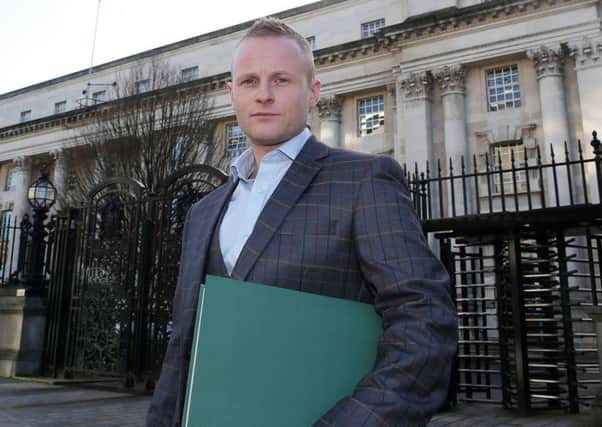Jamie Bryson appeals against Union Flag protest sentence


Counsel for the 25-year-old claimed the onus was wrongly shifted on to him to show he was oblivious to the illegal status of the marches in Belfast.
Bryson is seeking to overturn his convictions for taking part in unlawful public processions for which he received a six-month suspended prison sentence.
Advertisement
Hide AdAdvertisement
Hide AdSenior judges reserved their verdict on his appeal without asking to hear from prosecution lawyers.
Bryson, of Rosepark in Donaghadee, Co Down, had fought charges linked to widespread demonstrations over the decision to restrict the flying of the Union Flag at Belfast City Hall.
The allegations included four counts of participating in un-notified public processions during January and February 2013, and obstructing traffic on the city’s Newtownards Road.
At his trial last year he insisted he did not know the protests could have been unlawful, and claimed he was the victim of a political prosecution.
Advertisement
Hide AdAdvertisement
Hide AdHe accepted featuring on CCTV footage of the events, but repeatedly stressed that each time he walked to and from the centre of Belfast as an individual.
During the contested hearing prosecution counsel had accused him of treating police who interviewed him with contempt.
The court heard Bryson told officers quizzing him about the marches that he was an Irish republican and the First Minister.
He even suggested a fictional gay relationship with fellow campaigner Willie Frazer, it was claimed.
Advertisement
Hide AdAdvertisement
Hide AdIn an unusual move defence lawyers called one of Northern Ireland’s most senior police officers to give evidence as part of their case.
Assistant Chief Constable Will Kerr told how he agreed to meet Bryson and loyalist community representatives as part of efforts to ensure their weekly demonstrations did not break the law.
Mr Kerr also insisted that he warned those at the meeting on January 29, 2013 of the “criminal justice consequences” of taking part in un-notified public processions.
Bryson was at the Court of Appeal for the bid to overturn his convictions, where arguments centred on the legislation used to prosecute him.
Advertisement
Hide AdAdvertisement
Hide AdThe Public Processions (Northern Ireland) Act 1998 had left him facing a reverse burden to prove he did not know, or have reason to suspect the demonstrations were unlawful.
Bryson’s lawyers had previously contended that was a breach of his human rights.
Lord Chief Justice Sir Declan Morgan pointed out that the issue was the state of his knowledge.
At one stage he told defence counsel: “Surely police officers are not required to walk around the city with signs that this legislation applies to any spontaneous procession that may occur?
Advertisement
Hide AdAdvertisement
Hide Ad“Are they supposed to talk over people who are shouting so they can be heard? That’s a ludicrous suggestion.”
He continued: “If they shouldn’t do that then surely that reinforces the point that the factual matter requiring to be proved by the accused is a matter which is within his own knowledge in terms of the statute.”
But Richard McConkey, for Bryson, contended: “One must look at whether the burden shifting to the appellant is justifiable and reasonable. I submit it isn’t.”
Sir Declan, sitting with Lord Justice Gillen and Mrs Justice Keegan, told prosecution barrister David Russell he was not required to make any submissions.
Reserving judgment, he pledged to deliver a written verdict dealing with the issues in due course.